Every jiu-jitsu fighter has a wicked, more cruel and merciless enemy that makes anyone tired and exhausted, or even give up after some time of battle. Weight loss, in all spheres, is the most complicated part of a sports professional’s journey.
To reach their maximum level of excellence, according to Dr. Seba Sousa, a BJJ athlete needs to avoid drastic methods to lose weight. On some occasions, due to lack of follow-up, they choose to dehydrate right in the week of the fight.
“Some athletes don’t like to go on a diet — that’s the truth — and that makes their lives very difficult,” Dr. Seba said in a recent interview. “When they align their diet weeks or months in advance, already targeting gradual weight loss, that’s perfect; they manage to stay hydrated, with minerals, amino acids and vitamins essential to doing their job at the highest level. Everything takes a while; losing weight doesn’t happen overnight. There are athletes who lose 5 to 10 kg in a week; this is harmful to the body. The athlete needs to eat well and do nutritional periodization; they will be able to reach the weight they want with strength and endurance. Here is some advice for you, BJJ athlete: don’t dehydrate!”
Dr. Seba is a black-belt of 18 years under Professor Marcos Barbosa, with whom he trains in São Paulo. With work focused on weight loss for over 9 years, Seba created his own weight loss method, Perde Mais, where he has already managed to eliminate more than 1 ton of kilos when you add up all his patients.
“Perde Mais is a weight loss protocol that I created in these more than 10 years of medicine, where I have the QOL methodology,” said the doctor, who has a postgraduate degree in healthy longevity. “I treat my patient with a multidisciplinary team that includes a physical educator, a nutritionist and myself. The goal is for my patient not to return to their initial weight and improve their quality of life, avoiding future diseases of old age. Losing weight is linked to food, physical activity and physiological adjustments such as, for example, sleep and the hormonal side.”





